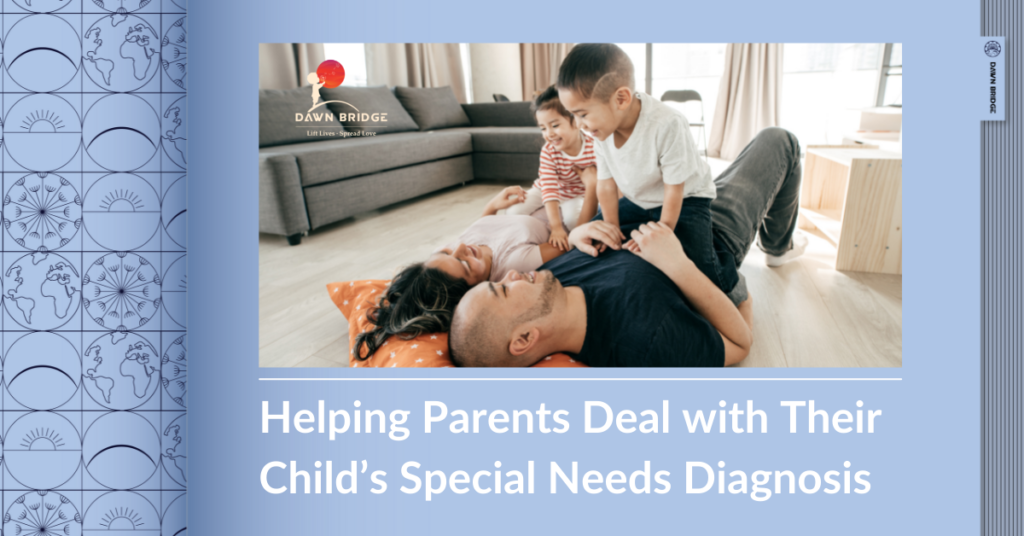Discovering that your child has a special need can be as traumatizing as learning of a family member’s sudden death. Many parents are stunned by such news. Receiving such a message can produce overwhelming emotions of shock, disbelief, anxiety, fear, and despair.
For some parents, there are many different thoughts that may run through their mind: “Is my child normal?” “Will he/she be successful in school?” “Will other kids make fun of him/her?” “What will his/her future be?” “Why me” and conclude that they are being punished for sins or bad acts of the past. As these thoughts begin to develop, parents may also try to determine if the disability is short-term and “fixable” or whether the diagnosis is more severe, requiring lifestyle changes throughout the entire family. This is all done in an attempt to quickly comprehend information about the disability as well as try to find the best educational and life options for their child.
On the other hand, Dawn Bridge wants you to be as prepared as possible so you can negotiate the challenges that may await your family. Therefore, while we hope this article will guide you to sources that are helpful, take from our discussion only what you need.
Tips for helping parents accept their child’s special needs:
1. Dealing With Your Feelings Related To Having A Child With A Special Needs and Taking Care Of Yourself
The families of children with special needs may go through the emotional states described in the table below:
| Emotion | Examples of how the parent might display the emotion |
| Denial | Parent denies his or her child has a special need. |
| Fear | Parent goes through dramatic change that might affect his or her attitudes, values, beliefs, and routines. |
| Depression | Parent may experience uncontrollable tears, sadness, and feelings of hopelessness. |
| Guilt | Parent may feel he or she is somehow to blame for the disability or the situation. |
| Anger | Parent may act out his or her anger or direct it toward another person. |
Be patient and allow yourself the time to process what you’ve been told. Learn to work through each emotion until you reach acceptance. It’s important for both you and your child that you come to terms. Let go of the “what ifs” and the “what thens” and focus on what is happening today. When you do, you will be able to find peace, joy, and hope as you face each day together.
2. Make Time To Enjoy Your Kids
In fact, many families find that their child with a special need has positively impacted their lives by:
- Increasing their ability to love and to accept differences
- Strengthening their family ties
- Giving them a greater sense of pride in their child’s accomplishments
- Leading them to learn more about disabilities and advocacy roles
- Making them more patient, understanding, and tolerant
- Teaching them to enjoy the little things in life
However, child’s perception may be more positive or more negative and it is not set in stone. Thus, for people with disabilities, it’s important to allow themselves to view their disability as just one component of their life, not the only component. Parents may provide a crucial role in shaping a child’s concept of him or herself. Parents also can raise a child to be independent and successful or inadequate, incapable, and inferior. Friends and society also can powerfully influence a person’s concept of them self and how their life has been affected.
3. Access For Information and Ask For Help
One of the things you can do that may prove enormously helpful, now and in the future, is to collect information — information about your child’s special need, about the services that are available, and about the specific things you can do to help your child develop to the fullest extent possible. Collecting and using the information available on disability issues is a critical part of being a parent of a child with special needs.
• Seek for Professionals

A medical doctor is often the professional who makes a special need diagnosis; however, other professionals, such as a psychologist or speech-language pathologist, may provide valuable information relating to your child’s special need. A great place to start is to talk to those professionals, including doctors, therapists, counselors, school psychologists, and your child’s teachers, so that everyone who has a hand in the child’s education has the best interest of the child first and foremost.
• Work with Community

Fortunately, there is a great deal of information available on many disabilities and many special need issues. For example, families with a young child with disabilities should access early intervention services, which are designed to identify and treat developmental problems as early as possible. For school-aged children with special need, special education and related services can be important factors in addressing a child’s educational needs. Other considerations may be the need for additional instruction provided in special classes with specially-trained instructors, help from tutors, and/or support from mentors for guidance and encouragement.
• Join Support Group
There are many support groups for parents of children with the same disability who meet regularly to express concerns about their child as well as receive support and encouragement from others who are experiencing the same feelings. For this reason, it is worthwhile to join a parent’s group. Some groups are organized around one particular disability (e.g., cerebral palsy, down syndrome, ASD), while other groups draw together parents who, irrespective of the disabilities of their children, have similar concerns, such as daycare, transportation, coping, or finding out about and supporting special education in their community. Within each of these groups, information, emotional and practical support, and common concerns can be shared. The power of this mutual sharing to combat feelings of isolation, confusion, and stress is a consistent thread running throughout the literature written by and for parents.
HEY! You’re invited to join the Special Needs Parent Support Group by Dawn Bridge where all parents can join in conversation about special needs and supports – led by trained facilitators, they provide comfort, hope, and a sense of community.
Summary
In this article, we have looked at many of the issues facing you as parents of a special needs child. Learning that your child has a disability or special condition is just the beginning of the journey. At times, you may feel overwhelmed by the challenges associated with disability and by the strength of your own emotions.
You are not alone in this! However while you may feel alone and isolated, there is help out there and you are going to be the best parent your child could ask for!
Reference
Childhood Disability: A Parent’s Struggle, by K. Moses, 1987, and You Are Not Alone: For Parents When They Learn Their Child has a Disability, by P. McGill Smith, 2010.
Strength in Diversity: Positive Impacts of Children with Disabilities – The Vanier Institute of the Family / L’Institut Vanier de la famille. (2022). Retrieved 2 March 2022, from https://vanierinstitute.ca/strength-in-diversity-positive-impacts-of-children-with-disabilities/
Survival Tips for Special Needs Parents. (2022). Retrieved 2 March 2022, from https://centerforparentingeducation.org/library-of-articles/focus-parents/survival-tips-for-special-needs-parents-youre-not-alone-i-promise/

